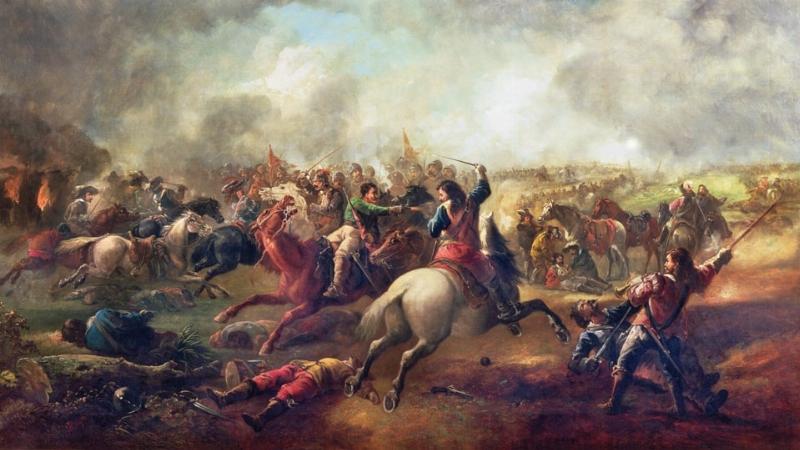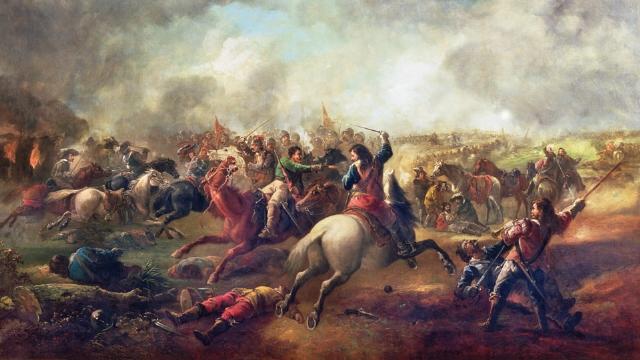



From Wikipedia Commons: The Battle of Marston Moor (John Barker, before 1886)
In historical times, the British Isles were first inhabited by Celts. Then they were invaded by Romans who withdrew after a few hundred years. Anglo-Saxons immediately replaced the departing southerners, landing in droves on the English east coast. Vikings also crossed the North Seas and tried their luck, gradually integrating with the natives. Finally, the isles were conquered by Normans — a third Germanic wave.
England and the rest of Britain have experienced numerous invasions from outside. However, ethnic peculiarities of neighboring peoples from the continent have been absorbed into the existing culture and have enriched it over time. Only in the last thirty years have the British experienced unlimited flows of aliens that threaten their own culture with extinction.
In addition to foreign invasions, British history is punctuated by moments of intense internal conflict. The English Civil War (1642–1651), a series of armed clashes between Parliamentarians and Royalists (known as “Roundheads” and “Cavaliers”, respectively), became instrumental in shaping the Britain that we used to know. The protracted state of war, intermittently complicated by Scottish and Irish independence efforts, not only settled the balance of power between monarchy and parliament but also deeply affected the religious, cultural, and political fabric of the nation.
Pious, proud, and principled, Charles I, son of Scottish-born King James VI, House of Stuart, ascended the English throne as ruler of three kingdoms (England, Scotland, and Ireland) in 1625. Like his father, he believed firmly in the divine right of kings: the idea that monarchs were appointed by God and accountable only to Him. This belief tempted him to govern without parliamentary consent for long periods and impose unpopular taxes and policies. The urban bourgeoisie (e.g. merchants) and lesser gentry resented his autocratic rule and demanded a greater share for Parliament in governance.
Intra-Christian divisions plagued England long after the break with the Roman Catholic Church (1534). Officially, papal authority had been renounced. However, Puritans swore to cleanse their church definitively of any pre-Anglican liturgy. What is more, Parliamentarians of Puritan persuasion viewed the king’s religious policies as Catholic-leaning and obstinate. Royalists, on the other hand, supported the hierarchical Anglican church and the king’s authority over religious matters.
While Royalists were largely aristocrats, greater gentry, and others loyal to tradition and monarchy, eager to maintain the established order, Parliamentarians, by contrast, included politically ambitious segments from prosperous areas and Puritans impatient for more parliamentary authority and religious reform.
The war was fierce and brutal. Battles such as those of Marston Moor and Naseby eventually decided the matter, leading to the capture and trial of King Charles I in 1646 and 1649, respectively. Anticipating the fate of Louis XVI and Nicholas II, his public execution was a dramatic turning point that shocked Europe.
A shrewd commander and devout Puritan, Oliver Cromwell would prove his abilities as leader of the Parliamentarian movement. After the royal execution, he set up the “Commonwealth of England”, a republican government that abolished the monarchy and the House of Lords. With the tyrannical privilege of making arbitrary decisions, a “proto-revolutionary”, he ruled Britain as “Lord Protector” (a peculiarly Orwellian title). However, his tenure brought relative stability after years of unrest. Distrustful of both Catholics and political dissenters until the end, he enforced Puritan moral reforms.
Civil wars inherently threaten social cohesion by pitting neighbor against neighbor. Yet, the English example shows how they may paradoxically increase sociocultural integration. So, albeit destructive in the short term, the war created a narrative vital to “nation building” — the process of forging an integrated political community from diverse social and religious groups. The conflict forced England to reconsider the nature of authority and governance. Ultimately, by challenging the divine right of kings and stipulating parliamentary sovereignty, Parliamentarians laid the foundation for a constitutional framework that unified the nation under shared laws and institutions.
The historical process drew inspiration from politico-legal traditions dating back to the Magna Carta of 1215. Signed nearly 400 years before the war, the charter stated that neither the king himself nor his government was above the law. Additionally, it guaranteed certain legal protections to the nobility. Originally intended to curb the abuses of King John, it became a venerable symbol and legal precedent for limiting royal power. Its ideals — such as the protection against arbitrary rule and the affirmation of legal rights — were echoed by Parliamentarians as they resisted King Charles I’s autocracy.
In the context of national reconciliation, the Restoration Settlement of 1660 was to become a precursor to the constitutional monarchy. At his coronation, Charles II accepted the limits on royal power decided by Parliament. A purported advocate of tolerance, he tried to restore social peace and trust. Much as the war disrupted traditional institutions, it stimulated new ideas about governance, rights, and religious freedom.
Recovering from hostilities, which highlighted the menaces of autocracy and religious intolerance, the nation showed resilience. Inspired by principles of “parliamentary sovereignty”, “rule of law”, and “individual rights”, it fostered a political culture that prized negotiation, legal frameworks, and representative government.
Like a phoenix, England emerged as a remarkably stable, orderly, and civilized society — the cradle of modern Western civilization. The laborious process of nation building, highly indebted to Magna Carta, and the post-war reinforcement of social cohesion succeeded after all. The English people united in a common culture, ensuring its long-term prosperity and global legacy.
Now, however, patiently invaded, England is broken. Unlike the drama at Hastings in 1066, the Islamic conquest has been insidious. Across the British Isles, a shift is taking place from a high-trust society, presupposing a homogenous culture, towards a multicultural “no-man’s-land” characterized by widespread suspicion and division. Alienation originates from foreign clan loyalties, which corrupt civil society and public institutions, religious supremacism, and social segregation.
Analogous to Mao’s “Long March”, Marxist activist Rudi Dutschke introduced the “Long March through the Institutions”. The revolutionary scheme was to seize academia in order to prepare the “people” for the showdown with Western civilization. In 1997, PM Tony Blair decided to change his country forever and let the Muslim masses in. Fresh supplies of “dispossessed” became necessary for socialist rule in the absence of a belligerent working class. At this point, public institutions had been taken over by anti-Western progressives.
In recent years, jihadist atrocities committed by rape gangs have provoked public outrage. Targeting minors has proven to be a criminal specialty of certain ethnic groups. In the wake of a cover-up by authorities and politicians, news media have revealed the depth of Islamic contempt, intertwining with concerns about mass immigration and Islamization of society. The unprecedented case of tribal warfare has increased tensions and distrust between communities and public institutions.
As the invasion progresses, the future balance of power becomes clearer. Christians, whether Catholic or Anglican, and Jews are in retreat. The political elite, as if it were a vassal court, betrays the indigenous people, denying them the right to speak freely and defend themselves against injustice. Unforgivingly, its police and courts persecute those who openly resist the anti-civilizational transformation of society.
If the ancient giants could see their descendants humble themselves and cower before Muslim invaders — see them submit and become enslaved in their own homeland, surrendering the green isles that their ancestors cultivated and inhabited for millennia… Anglo-Saxon, Viking, and Norman warriors alike would turn in their graves.
David Betz, Professor of War at King’s College, London, argues that Western societies — particularly Britain — are drifting towards a new kind of civil war. Nothing like a war in the traditional sense, it is a decentralized, low-intensity conflict rooted in tribal identity, grievance, and collapsing trust.
As public institutions fail to mediate social tensions, animosity freezes along ethnic, religious, and ideological lines. Betz sees growing alienation among young people, eroded faith in political systems, and state incapacity to enforce norms as ominous signs of breakdown. Awaiting the caliphate, as predicted by demographics, the warring parties will engage in urban disorder, infrastructure sabotage, and community self-policing. In the crumbling ruins of Western civilization, the state itself becomes just one faction among many. Lebanonization. Anarchy.
For Britain, that is the end of the road.
